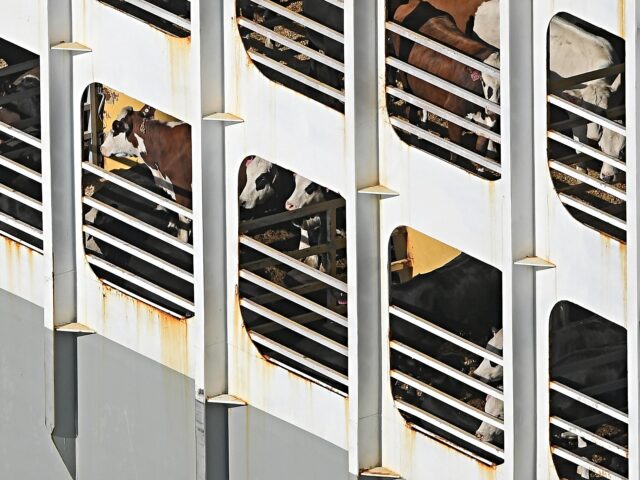Houthi terrorist attacks are currently blocking a ship bound for Israel carrying 14,000 sheep and 2,000 cattle from completing its voyage, leaving the crew uncertain where its live cargo sourced from Australia will be taken.
The Marshall Islands-flagged MV Bahijah sailed from Fremantle in Western Australia on January 5, bound for Israel with a huge cargo of live animals. On January 12, the Australian Department of Agriculture ordered the ship to turn around “due to the worsening security situation” in the Red Sea, where terrorists armed and funded by Iran have been relentlessly attacking commercial ships despite U.S. and British Navy efforts to protect them.
The ship duly returned to Fremantle but was not allowed to offload its live cargo due to Australia’s extremely strict biosecurity regulations.
Australian Livestock Exporters’ Council chief executive Mark Harvey-Sutton explained on Thursday that under Australian laws, livestock that have been marked for export and shipped out of the country cannot be resold in the domestic market. Any animals offloaded from MV Bahijah into Australia would probably be kept in quarantine until another foreign buyer could be found.
“It’s a multibillion-dollar industry, and a lot of our market access is actually underpinned by the fact that we do not have a large number of livestock diseases, and one of the ways that we maintain that status is by not letting animals go back on farm,” Harvey-Sutton said.
After floating off the West Australian coast for three days, the Bahijah docked on Thursday. It still has no planned final destination, raising concerns about the welfare of animals trapped on board for nearly a month, especially since Western Australia is currently experiencing a heatwave.
On Friday, the Australian agriculture department acknowledged public interest in the fate of the Bahijah and its animals. Agriculture Secretary Adam Fennessy said the ship has taken on more provisions, including “additional fodder and fuel,” and additional veterinarians were sent aboard to help the exporter’s registered vet care for the sheep and cattle. The ship pulled away from its dock for a time on Thursday to clean the animal pens and replace bedding.
Not good. Not good at all. https://t.co/NbjXEtit2B
— Breitbart News (@BreitbartNews) January 3, 2024
“It was good to see that the MV Bahijah was able to resupply essential provisions today. This is an appropriate and prudent measure to continue to maintain the welfare standard for the livestock onboard,” said Australian Chief Veterinary Officer Beth Cookson.
Cookson said there were “no significant animal health or welfare issues identified,” and “no signs of exotic disease present in the livestock.”
Fennessy explained that the exporter, Israeli-based Bassem Dabbah Ltd., has applied for a permit to re-export the animals. The public has been critical of Australian regulators for taking too long to evaluate the application, but Fennessy said the exporter was late in filing the paperwork.
Australian agricultural association WAFarmers on Thursday called for Agriculture Minister Murray Watt to resign over the unacceptable delay in getting the animals off MV Bahijah, while animal rights activists are using the incident to demand the immediate shutdown of the entire live sheep export industry.
“The Department has actually been the cause of more potential animal welfare issues than anybody else. We really need someone’s head to roll over the incompetence that has been shown over this,” said WAFarmers Federation President John Hassell.
Hassell said Watt should have personally traveled to Fremantle to deal with the Bahijah situation or “encourage his staff to get it done as quickly as possible.
“You’ve really have to wonder where the Government’s priorities lie. I think agriculture is very low on their scale,” Hassell mused.
Biden's failed leadership is making the world less safe. Here's a perfect example of how: https://t.co/0ISUQVMarv
— Breitbart News (@BreitbartNews) December 29, 2023
“There’s no animal welfare issues but there could have been. The indecision by the Department of Agriculture has been despicable,” he said.
“Leaving sheep and cattle on the MV Bahijah in the scorching summer heat is animal torture,” said Australian Greens Party deputy leader Sen. Mehreen Faruqi. “the government already made one gross error by approving his trip through a conflict zone. Sending them back out on another long journey is absolutely unacceptable.”
Faruqi was referring to Bassem Dabbah’s application to unload some of the animals in Fremantle and ship the rest to Israel using the alternate route around Africa, which avoids the Houthi-menaced Red Sea but adds about two weeks to shipping time.
The Royal Society for the Prevention of Cruelty to Animals Australia (RSPCA) on Wednesday denounced regulators and the exporter for being “apathetic” to the “escalating crisis” aboard the Bahijah, and denounced the plan to ship the animals to Israel via the longer and safer route, since the sheep and cattle are already under enormous stress from 26 days at sea.
“They have already endured sustained heat and humidity, weeks of living in their own waste, crowding, unfamiliar environment and volatile movement of the ship. To subject them to what could end up being a total of 60 plus days of this is inarguably unconscionable,” said the RSPCA.

COMMENTS
Please let us know if you're having issues with commenting.